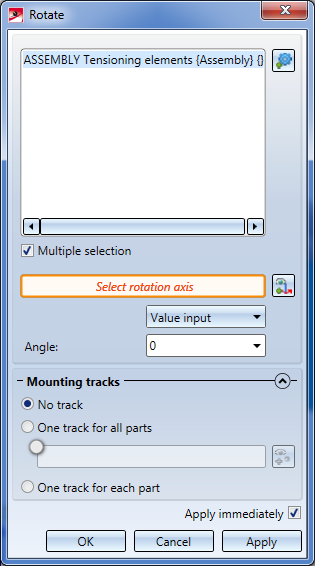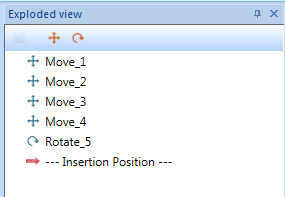
Exploded view > Motion type > Rotate. 
If the Exploded view mode is active, you can use this function to define rotations for the exploded view.
When you call the function, the Rotate dialogue window will be displayed:

Proceed as follows:
 symbol and identify the desired part in the ICN or in the drawing. The part will then be highlighted. If the Multiple selection checkbox is active, you can also rotate several parts in one step. The chosen parts will be listed in the dialogue window.
symbol and identify the desired part in the ICN or in the drawing. The part will then be highlighted. If the Multiple selection checkbox is active, you can also rotate several parts in one step. The chosen parts will be listed in the dialogue window. If you right-click on a part in the part selection list, you have the option to delete it. Multiple selections are also possible.
 When you call the function, the active part will be shown in the part selection list.
When you call the function, the active part will be shown in the part selection list.
The rotation angle can be determined selecting a point, by entering a value or by selecting two points. If required, choose the desired type of rotation before determining the angle. If the Select rotation axis field is highlighted with an orange frame, you can determine the axis immediately. If this is not the case, click the  . Diesymbol to choose the axis. The rotation axis can be determined by selecting two points, or an edge, or a surface. In case of a surface, the rotation axis will be defined by the surface normal. You can also use the functions of the context menu (right-click) to determine the rotation axis.
. Diesymbol to choose the axis. The rotation axis can be determined by selecting two points, or an edge, or a surface. In case of a surface, the rotation axis will be defined by the surface normal. You can also use the functions of the context menu (right-click) to determine the rotation axis.
The further procedure depends on the type of angle determination you choose:
During rotation axis determination a preview of the rotation will be shown.
Furthermore, you can right-click to open a context menu with the following additional functions:
|
|
Origin
|
|
|
X-axis
|
|
|
Y-axis
|
|
|
Z-axis
|
|
|
Step back
|
|
|
Cancel
|
Depending on the selected option a preview of the mounting tracks will be shown in the model drawing. To determine the appearance of the mounting tracks mounting tracks, use the parameters of the Default settings for mounting tracks  function, or, in the Configuration Editor, the settings at Drawing > Views > Exploded views.
function, or, in the Configuration Editor, the settings at Drawing > Views > Exploded views.
If the Apply immediately checkbox has been activated, the transformation will be directly applied as shown in the preview, and entered into the Exploded view log, i.e. you do not have to click on the Apply button.
If the checkbox has been deactivated, use the buttons instead: Clicking OK applies the displacements and closes the dialogue window. Clicking Apply also applies the transformation, but the dialogue window remains open, enabling you to define further transformations if desired. Clicking Cancel closes the dialogue window, and transformations that have not been applied yet will be discarded.
Each applied transformation will be recorded in the Exploded view docking window, e.g.:

Via this "explosion log" you can also change transformations of the exploded view subsequently.
![]() Please note:
Please note:
This function can also be called via the theExploded view docking window.

Exploded View • Representation Functions
|
© Copyright 1994-2018, ISD Software und Systeme GmbH |